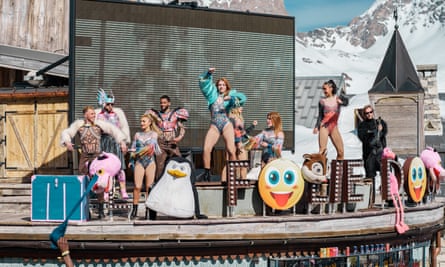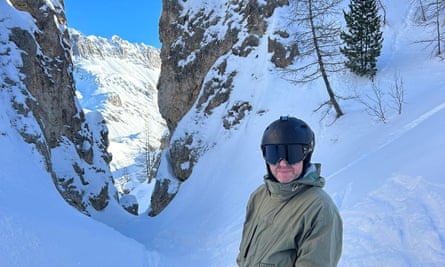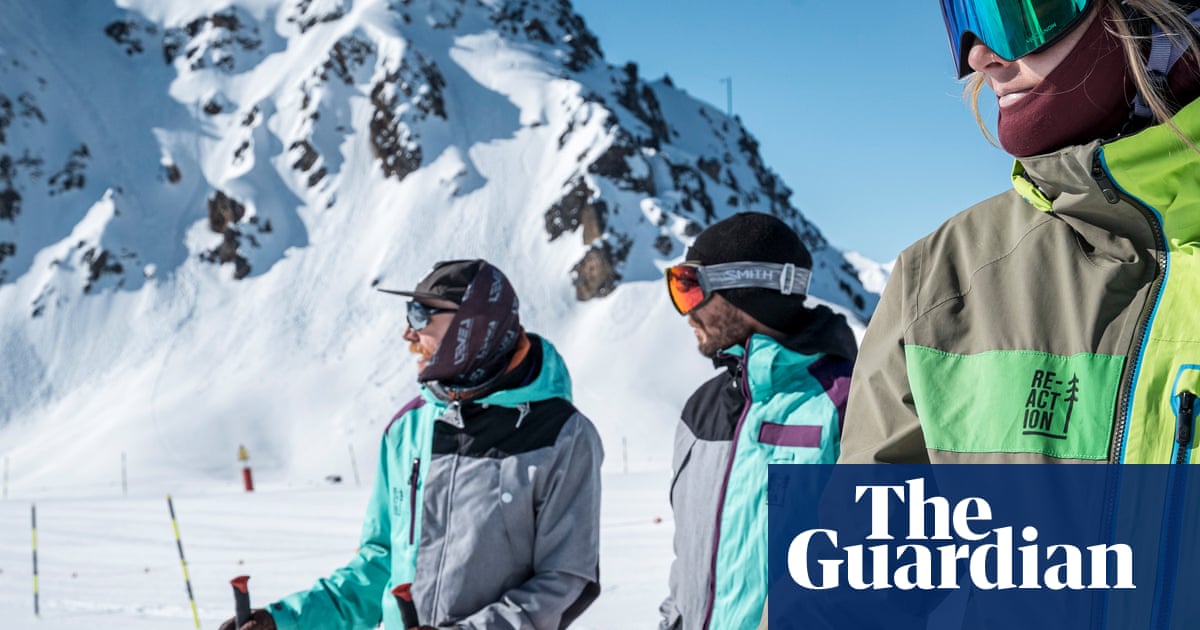‘You should be very proud,” said Chemmy Alcott, as my face smacked into thick snow for the third time and my goggles began to steam up with the exertion of constantly righting myself. “You’re one of the first 100 people to come through here this season. You’re flattening the trail, making it easier for everyone else.”
Alcott, a one-time Olympic downhill ninja and now the effervescent co-host of the BBC’s Ski Sunday, had swung us into the Hidden Valley, one of her secret showstoppers in the Tignes area, after delivering a warning. “This is off-piste,” she said, suddenly serious. “So you do this at your own risk.”
As we jittered on to the snaking trail, which was about the width of a tea tray, we quickly realised this wasn’t a valley at all: more of a tight, twisting gorge, flanked by sheer-sided boulders and dotted with hair-raising drops that even Alcott couldn’t descend without taking off her skis.

“What a mellow morning,” she said breezily, as the sunlight cascaded through the pines all around us. That wouldn’t have been my word for it, especially when the track veered into a delightful snow-dusted forest. I caught an edge and ended up cartwheeling down the mountain, almost taking out some hikers snowshoeing up through the drifts. “Those runs we did to get here,” said Alcott when I finally caught back up, “they’re lovely and they’re fun – but they’re not memorable. This is memorable.”
It was a spectacular introduction to the many delights of Tignes – and it was just the warm-up. Ahead lay the Four Corners Challenge: an up-at-dawn, skip-the-long-lunch sprint around the extremities of Espace Killy, as the linked area of Tignes and Val d’Isère is called. This odyssey reaches its giddying climax atop the wind-blasted Grande Motte glacier, some 3,456 metres up.
As I lay sweating in the hotel sauna that evening, I could feel the impact of the slopes on every bit of my body. But nowadays, of course, you also have to think about your own impact on the slopes. Global heating is already having a devastating effect on the Alps, with the lack of snowfall leaving resorts, especially lower ones, struggling to stay open for the whole season. One, La Sambuy, has permanently closed its slopes.
For once, though, I was able to enjoy these breathtaking mountains without the gnawing guilt generally associated with reaching them. I’d come by rail, departing from London St Pancras at 9am on a Saturday – aboard the inaugural journey of Eurostar’s resurrected Snow Train, a service axed in 2020 when Covid struck.

After one rapid change at Lille, where we didn’t even have to switch platforms, our roomy TGV eased into Bourg St Maurice after nightfall, having sped past some ravishing sunsets over gleaming lakes. The train certainly seemed popular with Brits: our hurtling juggernaut ran out of tea in one hour flat. From Bourg, in the heart of the French Alps, it was just 40 minutes by minibus to Tignes.
While transport will make up the lion’s share of any snow holiday’s carbon footprint, hotels play a part too. We stayed at Rosset, a chalet-style hotel boasting a swish top-floor bar with mountain views, plush sofas, a crackling, cheek-sizzling log fire, and a seemingly endless supply of post-piste cake and pre-dinner canapés and fizz.
A five-minute walk from the Tignes lifts, Rosset has implemented waste, water and even clingfilm reduction methods, along with refillable toiletry dispensers and the requirement that guests pick dinner in advance, cutting down on food waste. This allowed me to choose from miso aubergine, roasted sea bass or steamed mussels, while biting into goat’s cheese on sourdough toast at breakfast.
Water is from the tap (bottled can be supplied) and the overall ethos is less meat, more veg, and a push to source locally – right down to the artworks on the walls. The hefty black-and-white images depict brooding and often cloud-shrouded mountains, all supplied by a local photography collective called Art’com and a far cry from the usual bland blue skies over airy peaks.

The Four Corners required an early morning trip on the Scare Chair, the nickname given to the Leissières link to the Pisaillas glacier, an oasis of fabulous and generally less-busy runs. Widely regarded as the world’s most frightening lift, the Scare Chair is a stomach-churning, high-speed ride up to a gnarled mountain ridge, followed by a lurching plummet down its other side.
It didn’t disappoint, providing a glorious gateway to everything that is great about Tignes, one of the highest resorts in Europe. You can knock about all day on its wide, weaving, twisting, banking, bread-and-butter runs, bouncing in and out of powder fields off-piste. But should you also have a yearning to go high, far and fast, Tignes takes some beating – as we discovered on every thrilling inch of the Four Corners, not least that long, final, dizzying descent from Grande Motte, reached by a funicular that shoots up a tunnel like a bullet through the black.
No wonder the après in Tignes and Val d’Isère tends to mean dancing on tables: the adrenalin just keeps coming. “I was voted the best dancer in Folkestone!” said the woman sharing a tabletop with me at the Folie Douce, or Sheer Madness, a legendary open-air party palace that blasts out bangers in the peaks above Val d’Isère, just as the sun begins to set. Chemmy Alcott, a Folie Douce superfan, had by now left us, but I could imagine her saying: “Other bars are lovely and fun – but they’re not memorable.” The Folie Douce, with its resident dancers in spangled outfits sharing stage space with a swirling light show, is certainly memorable.

There was plenty of cool kit on show (as well as two guys in Teletubby costumes). But I was pleased to notice, among all the flashy big brands, the occasional piece of Re-Action gear. Re-Action is a global collective with a branch in nearby Courchevel. There, five staff recycle the uniforms of, say, lift operators, ski instructors and chalet staff, repairing and patching costly garments that are generally tossed into landfill after just a few seasons.
“I used to own two boot-fitting shops,” Re-Action’s founder Gavin Fernie-Jones told me, over beer at the Loop bar in Tignes. “But I got tired of seeing the consumption and waste in the industry. People will even buy kit and just dispose of it at the end of their holiday. But we can take a €400 jacket, patch it up, put it on sale for €120 – and it’ll be gone in seconds.”

Fernie-Jones, who is 43 and originally from the Peak District, was wearing a “50/50”, a Re-Action speciality in which two jacket halves are spliced together, in this case one grey and one teal. It looked fantastic. “We want our stuff to be identifiable,” he said. “We’ve got our own look. The patches aren’t meant to blend in. They celebrate the work.”
In terms of eco-thinking, he added, Tignes is one of the better resorts, boasting Flocon Vert, or Green Snowflake, status. “Imagine mountains without bins,” says a common sign on its lifts. “Take your rubbish home with you.” So I did: mostly napkins, tin cans and used teabags, which I zipped into my bag as I left my hotel room, glancing one last time at the framed message on the table. “Help us go greener,” it said, “so our mountains don’t.”
Trip provided by Inghams Ski, which offers seven nights half-board at Hotel Rosset, Tignes, departing from London St Pancras, from £1,438 per person, based on two adults sharing. All trains and transfers included







